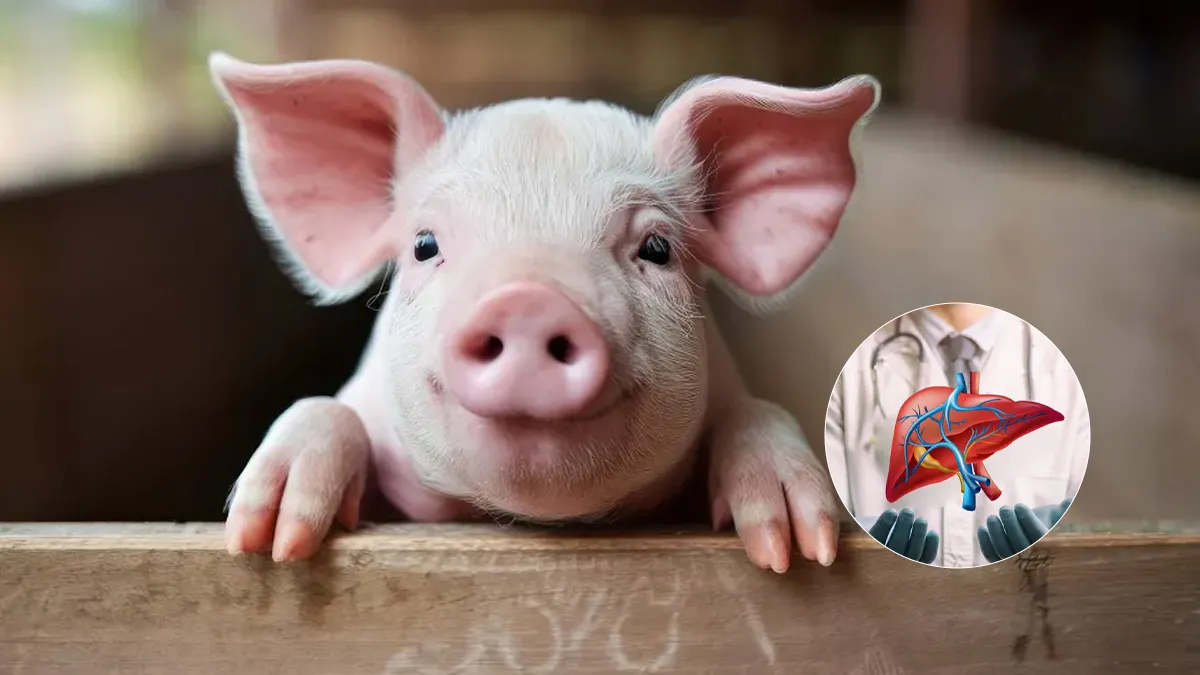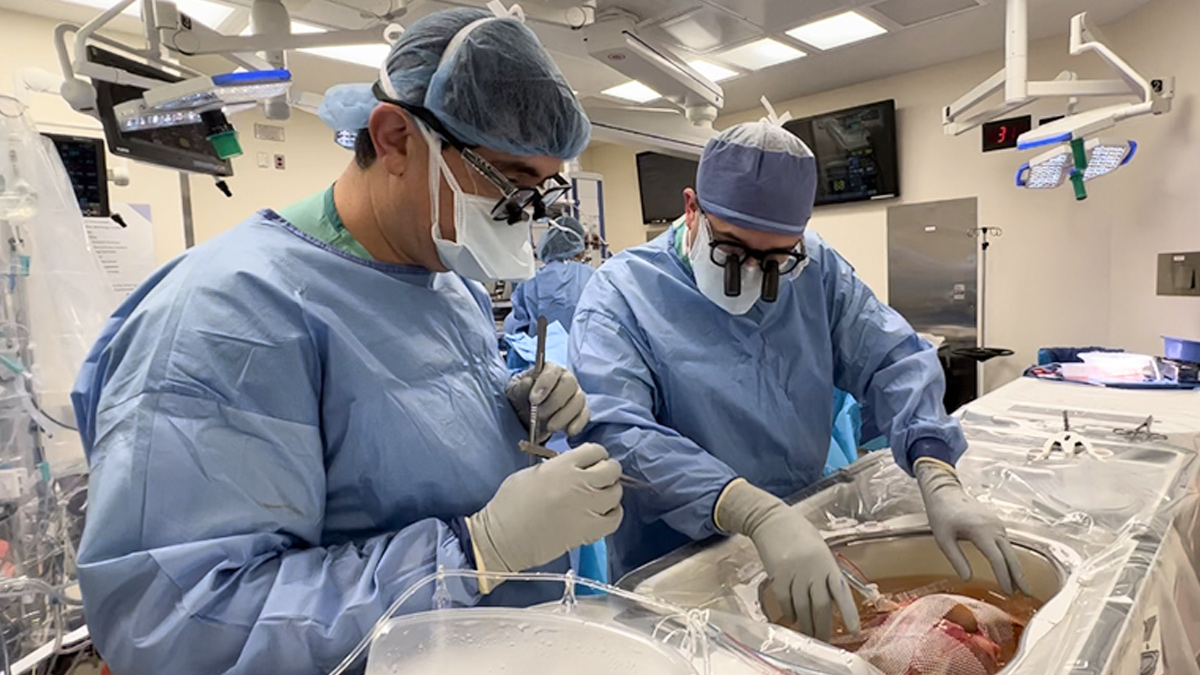
A recent medical breakthrough from China has captured the world's attention: a 71-year-old man survived for over 170 days after receiving a genetically engineered pig liver transplant. This remarkable milestone marks the longest survival period documented for a human patient treated with an animal organ.
Table of Content:-
The surgery, performed in May 2024, is being hailed as a major step forward in the field of xenotransplantation. It is the practice of transplanting animal organs into humans, offering hope to thousands of patients awaiting life-saving organ transplants. To know more about the surgery, we reached out to Dr Vivekanandan Shanmugam, Lead Surgeon, Liver Transplantation, SIMS Hospital.
Details About The Pig Liver Transplant Surgery ![pig liver transplant 2 - 2025-10-10T105746.627]()
The patient had severe liver disease caused by hepatitis B and a large liver tumour. His condition made him ineligible for a human liver transplant due to a lack of donors and the severity of his illness. As a last resort, doctors in China used a segment of liver from an 11-month-old genetically modified pig.
The pig was specially altered with 10 gene edits to reduce the risk of immune rejection and infection. The surgery involved removing the diseased tumour portion of the patient's liver and attaching the pig liver to the remaining portion. The pig liver began functioning immediately, producing bile and key blood clotting factors, with no signs of immediate rejection or inflammation. Ultrasounds confirmed good blood flow through the new organ.
However, within 25 days, the patient's heart showed signs of stress, and by day 38, the pig liver was removed due to a serious transplant-related complication called xenotransplantation-associated thrombotic microangiopathy (xTMA). Despite this, the patient survived for roughly five and a half months (171 days) after the surgery with medical support before succumbing to internal complications unrelated directly to the transplant itself.
What The Expert Says About The Surgery?
Dr Shanmugam explains this process of transplantation of an animal organ into a human body is called xenotransplantation. "This has happened many years ago but what is new in this recent Chinese transplant is that the pig has been genetically modified so that the rejection will not happen. But despite that the patient did have complications on day 25 and then after which the pig liver was removed and then the patient survived for close to five months," he shared.
According to the expert, there are two important things in this. He adds, "It clearly denotes that it can be successful provided some more work has to be done. So I would have thought that maybe in 10 years 15 years time there will be no short of organs because we can produce genetically modified baboons or pigs so that their organs can be transplanted because as of now there is a significant short of organs and people are dying for want of organs. But caution has to be demonstrated here because this is still not a scientific procedure it's an experimental procedure."
In India the laws are very very strict against xenotransplantation so we should not embark on this as of now but wait and see what happens in the scientific community. However, Dr Shanmugam adds, "I do welcome this move but definitely as I said earlier this is a scientific this is not a scientific procedure as yet so it has to be taken with caution."
ALSO READ: Sweet Fix for Balding? Study Finds Natural Sweetener May Support Hair Regrowth
About the Study and Its Significance
The surgical team published their findings in the Journal of Hepatology, detailing this world-first transplant case. Dr Beicheng Sun, head of the surgical team, explained, “This case proves that a genetically modified pig liver can function temporarily in a human, offering crucial support while the patient's own liver regenerates or waiting for a human donor”.
Key points from the study include:
- The pig liver produced vital metabolic and synthetic liver functions for over a month.
- There were no immediate signs of immune rejection or inflammation during the initial days.
- The main challenge remains controlling blood clotting and immune responses triggered by xenotransplantation.
- This surgery is seen as a bridge rather than a permanent solution, buying critical time for patients with acute liver failure.
A Related Scientific Insight
A study published recently in the American Journal of Transplantation reviewed xenotransplantation advances and highlighted this Chinese work as a “pivotal clinical milestone” in demonstrating the feasibility of pig-to-human liver transplants. While complexities remain, particularly in immune and clotting management, the research points toward a future where genetically engineered animal organs may help resolve global organ shortages.
What This Means for the Future![pig liver transplant 1 - 2025-10-10T105743.004]()
- Thousands of people worldwide die annually waiting for human organ transplants.
- Pig organs share anatomical and functional similarities to human organs and can be genetically modified to reduce rejection.
- Temporary pig liver implants could serve as life-saving bridges, allowing patient recovery or time to find human donors.
- Further research and clinical trials will focus on overcoming clotting and immune complications for long-term success.
ALSO READ: Can Walking on All Fours Improve Your Strength? Expert Reacts To The Viral Trend
Conclusion
This landmark case from China signals a new era in transplant medicine. For the first time, a genetically engineered pig liver has supported meaningful human life for over 170 days, demonstrating both the promise and challenges of xenotransplantation. As scientists refine these techniques, hope grows for patients worldwide facing critical organ shortages and life-threatening liver disease.
Also watch this video
Read Next
Victoria Beckham Reveals Struggles with Body Image and Eating Disorder: “It Really Affects”
How we keep this article up to date:
We work with experts and keep a close eye on the latest in health and wellness. Whenever there is a new research or helpful information, we update our articles with accurate and useful advice.
Current Version
Oct 10, 2025 11:08 IST
Modified By : Vivek KumarOct 10, 2025 11:08 IST
Modified By : Vivek KumarOct 10, 2025 11:08 IST
Published By : Vivek Kumar

